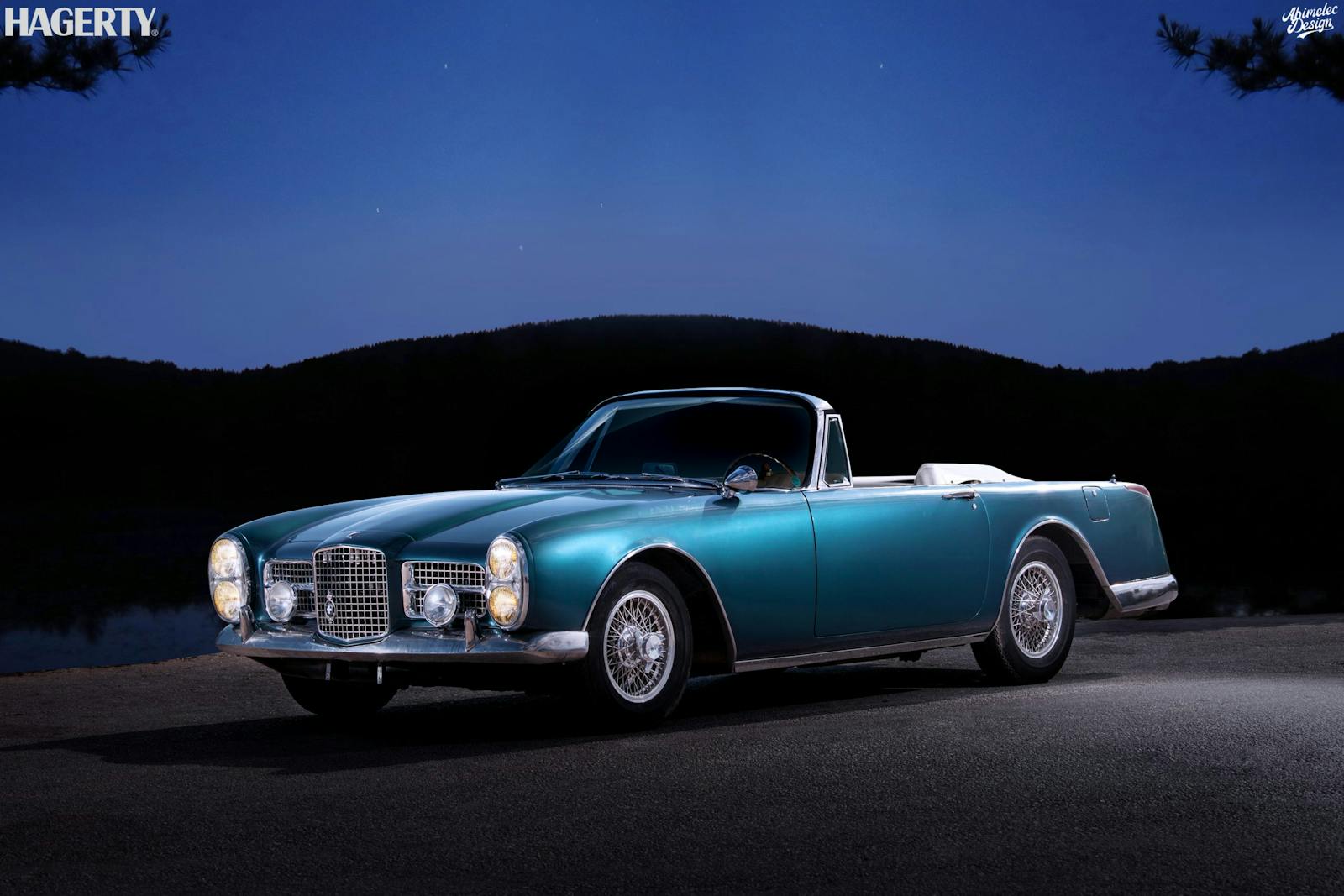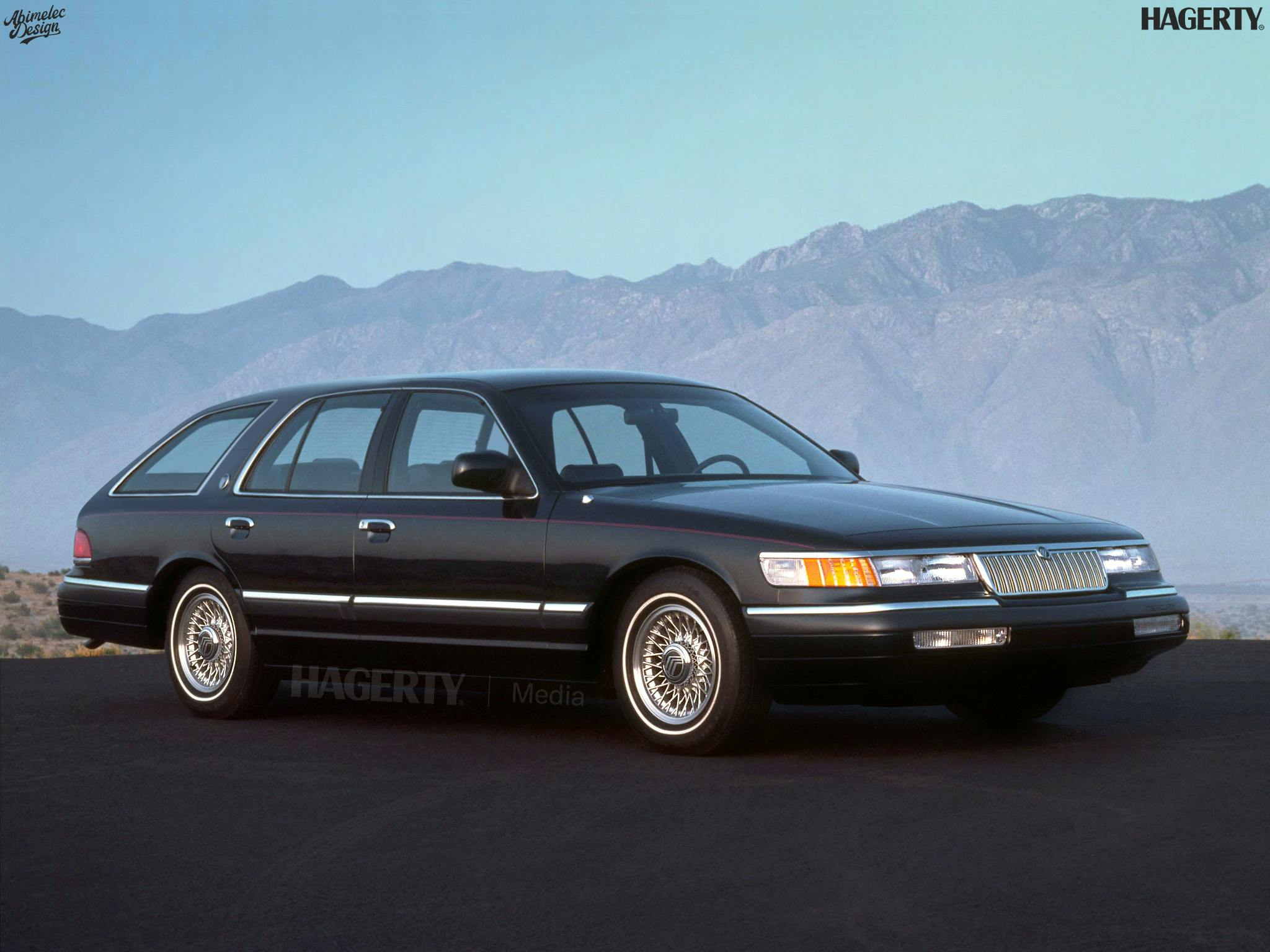Media | Articles
What If? Quick Take: 1992 Mercury Grand Marquis Colony Park
Welcome to What If? Quick Take, a new feature from imaginative illustrator Abimelec Arellano and Hagerty. While the cars shown in our regular What If? features are full 3D renderings and can appear in any number of images, the Quick Takes are off-the-cuff expressions of Abimelec’s imagination. Each one is accompanied by a short story. Enjoy! — Jack Baruth
Althea saw the shadows of the two young men swell on the ground between her and the driver’s door just slightly before she heard the slap of their Air Force Ones on the pavement. My hearing aids need a battery or two, she thought, turning to face them just as they came within arm’s reach. One short, one tall, neither old enough to vote.
“Give us that purse, old lady, or we’ll take it!” They’re not even armed, she thought. Look at what I’ve become: an old lady who can be robbed with bare hands. She screamed long and loud, an ancient keening that caused the boys to flinch but didn’t back them up. Alright, then. Plan B. Folding over and clutching her purse, she wailed,
“Help! Someone call an ambulance!” From a pocket inside the back of her deliberately frumpy old-lady purse she drew a Glock 43 with her right hand, then straightened up and shot the tall boy right between the eyes. “But not for me,” she clarified, as the shorter one turned to run. The ringing in her ears wasn’t as bad as she’d feared: Oh, yes, it’s definitely time to get some batteries. Yet she heard the sodden thump of the boy’s body hitting the ground, his face frozen in a permanent rictus of authentic surprise.
Such a waste. Just another young man dead. And for no reason. But there was no time to think about that now. If she knew this neighborhood, the same nosy people who had mysteriously been absent during the approach of her would-be muggers would come out of the woodwork now. Replacing the Glock in her purse pocket, she bent over to unlock the door of her Mercury wagon.
Marketplace
Buy and sell classics with confidence
Her hands were shaking. She was getting old.
Seventy-one years next month, as a matter of fact. And in a world that made any sense at all, Althea would have long since retired from the game. Indeed, she had retired, back in the early Nineties as crack swept the demand for powder cocaine off the streets where she’d made her reputation years before, in the cash-flush party scene of the Reagan Recovery. In the disco era she’d been a user the same as everyone else, but Althea was always a bit smarter than everyone around her and she could see that this was one business where a relatively poor young woman could get rich quick. Which she had done, stacking cash by the briefcase loads supplying parties from Atlanta as far north as Charlotte. Over the course of twelve years, she’d never gotten caught. A few of her people had been snagged, and she paid them to stay quiet. The criminal penalties weren’t so bad then. Cops could be bought and even if they couldn’t, the laws weren’t designed to stop the party.
The IRS, on the other hand, had caught on quick. Althea had arrived in 1992 with some outrageous financials: close to $1.96 million in cash scattered throughout her home and the home of her family. She could dine out every night, wear couture, buy the kind of jewelry that had inhabited her childhood dreams of the Rat Pack and the glamorous life. But she couldn’t buy anything real. Couldn’t acquire property, couldn’t purchase investment instruments. She had a hair salon that could launder a hundred grand a year, tops. That was the limit of her reach. The system was designed to make sure she couldn’t join the upper crust, those people whose systems of crime and theft were infinitely more complex, and often far more harmful, than her simple hustle.
She really couldn’t even drive a nice car; it would attract too much attention. So when she’d turned the business over to her two nephews in ninety-two, she’d searched for the most luxurious vehicle that wouldn’t raise the eyebrows of the police or the tax cops. Mercedes-Benz and BMW had been out of the question. At the Lincoln dealership, a clued-in young man who had run packages for her a decade previously said, “Miss Althea, you don’t want the heat from driving a Town Car or a Mark. But they have a new car that is basically a Town Car, it’s the latest Grand Marquis, and if you get it as a Colony Park LS you won’t look like nothing but someone’s grandma.”
“I’m forty-two years old,” Althea snapped, “I’m nobody’s grandma.” But she saw the sense of the idea. With tax and title, it came out to just over twenty-four thousand dollars. She made four wire transfers: three for one-third each of the price, to stay beneath the ten-thousand-dollar reporting requirement, and one more for five thousand dollars to the F&I manager who would make it all look right.
The salesman hadn’t lied. The big Mercury rode and drove just like the Continentals she remembered from her youth, but nobody gave her a second look as she drove to the salon, to see family, to church. It didn’t need much maintenance. The leather grew shiny and wore thin; a nice young Hispanic man in the neighborhood re-covered the seats with merino wool. There was something about the spark plugs, but that wasn’t expensive to address.

After September 11, 2001, Althea was seized by an odd sense of regret: she’d never seen much of the country. Hadn’t really been anywhere except for the South and New York, the latter just for business. So she pointed the Colony Park wagon west, spinning the odometer past the 100,000 mark in Amarillo, Texas and not coming home until eight months and thirteen thousand miles later. Another local shop fixed the rust and repainted the body.
Her nephews, who never lost their sense of gratitude even as they became wealthy and profoundly dangerous men, kept trying to buy her cars. Sleek Mercedes convertibles, Lexus coupes that looked like startled frogs. At one point the younger one brought over something called an Azure, a stocky boat of a car that reminded her of a library reading room. “Aunt Althea, they can’t touch us, we have our hands on every lever in the South now. Drive something nice, you’ve earned it.”
“Let me tell you something,” she would always reply. “I never got caught. Repeat that. I never got caught. And if you want to retire with my admirable record, this … Azure … is not the ticket for that particular ride.” They’d laugh and take the cars back where they came from, but it didn’t stop them from expressing their own wealth in flabbergasting fashion. Rolls-Royces. Showcase homes. One of her customers at the salon brought her an Atlanta Magazine that had a whole feature on the interior design of one house. They called her nephew a “philanthropist and businessman.”
Well, the philanthropist and businessman was currently sitting in a Federal holding cell, probably next to the one occupied by his brother. The Feds had found a lockup with what Althea derisively called “the full Escobar”: three Hellcats, two crates of ex-National-Guard M16A2 rifles, and over eight thousand bricks of heroin. Then they had waited for the nephews to check up on their property, which they’d been stupid enough to do together.
A dour, jowly attorney named Levy had told Althea the bad news: unless the mother of all legal defenses could be laid on, they’d finish out their lives in prison. With enough legwork, enough lobbying, a series of $200-an-hour private investigators to cast doubts on each of the Feds involved? “I could see a ten-year plea deal,” Levy chirped, smoothing out the creases in a five-thousand-dollar briefcase. “Get them home before their fiftieth birthdays. And I know this judge. I think we could have them out on bail for a few months. Let them see their families. That can help, when you know you have a long time inside ahead of you.”
“And this costs …” Althea had just over a million dollars left.
“Bail is set at two million, cash. That’s each. I’ll need a $500,000 retainer by the end of the week, against a final bill that will likely be five or six times that. None of this should be a problem; your nephews should be sitting on that much spare change in their sofas.” But, as it turns out, they weren’t; the eight thousand bricks were just part of a much larger deal they’d set up and prepaid. They were expecting the arrival of five hundred kilograms at a ratty Florida boat dock in two weeks. Even assuming there was a fair amount of cut in the mix, that was over one hundred and fifty million dollars on the street; fifty million dollars at the dealer level.
But someone had to go get it. And the heat was on everyone, every associate. The Feds were watching for just this kind of breakout maneuver. Two days after their first meeting, Levy gave her an address. “It’s here. Or it will be, anyway. Have someone you trust pick it up.”
“As Anita Baker once said,” Althea responded, “I say if it’s going to be done, let’s do it. Let’s not put it in the hands of fate. Let’s not put it in the hands of someone who doesn’t know me.”
“What’s that mean?” Levy asked.
“It means I’ll do it,” Althea said, and she rose to leave. That was a week ago. She’d driven the old Colony Park down. A man on the boat, some Cuban-looking fellow, had been skeptical.
“Lady, this here is five hundred keeeelo-grams. You know keelo-gram? It is two pounds and more. You think you can put a thousand pounds and more into this old car?”
“One way to find out,” Althea had responded. In the end, it had proven best to fill the footwells and rear seats first, then layer the remaining packages three deep in the cargo area. Althea covered it with a sheet, then scattered some detritus she’d bought at a roadside flea market on top: tacky childrens’ toys, cheap clothing, dozens of vinyl albums. The Mercury was sluggish in the throttle, worryingly reluctant about shedding speed before a stop sign, and rode nose up on the freeway like JFK’s famous PT-109. But it attracted no attention.
Or at least it hadn’t, until she’d gotten within fifty blocks of her destination stash house and had been set upon by this pair of two-bit crooks on her way back out to the car from the convenience store. Stupid, lazy! she chastised herself. But she’d rubbed the skin on her hands raw during the long drive and had just wanted some lotion to deal with it. She never thought she would get this old, never thought she would have this paper-like skin, these ears that couldn’t hear anything, eyes that ran with rheum and fog. And shoulders that didn’t feel broad enough to carry this final load, this business of distributing and collecting on her nephews’ salvation.
It’s nearly over, she told herself, as she motored slowly away from the curb, the boy’s dead body awkwardly crumpled on the sidewalk. But five minutes later she saw flashing lights in her mirror. Slowly, like the old lady she resembled and resented, she pulled over. Got her license out. Put the Glock muzzle down in the crease next to the seatbelt buckle.
The cop coming up was old, white, fat, huffing a bit with the effort of it all. “Ma’am, I’m sorry to bother you, but we had reports of a Mercury wagon in the vicinity of a crime scene and just wanted to see if you had observed anything… Althea? Is that you?” Just her luck. It was Wilkins, a corrupt viper of a man who had put his kids through school on Althea’s payroll thirty-five years ago.
“Well, yes, Wilkins, it is clearly me. How nice to see you. I’m afraid I can’t tell you anything about any crime. I’m just going over to see some family.” Wilkins wheezed for a long moment, pondering his options.
“Althea, what’s under all that junk?”
“More junk.” Her heart was pounding. Slowly, with the imperceptible progress of a spider seen intermittently in the glare of headlamps through a bedroom window, she was reaching for the Glock.
“Do you suppose you should open up the tailgate and let me have a look?” Althea took a breath. There was one last option before the worst one.
“Wilkins … give me a number.” The cop closed his eyes, wheezed, thought.
“Five hundred large.” Thank God. She’d have that in a week. Wilkins wheezed again. “Now. I follow you to your house. You pay me now. Then you continue your … errand.” This was a problem. She’d cashed out for Levy’s retainer.
“Honey, I could give you a hundred today,” she replied, hating the sound of age in her voice that felt like it was taking a hammer to her powers of persuasion. “Or I could give you five hundred next week. What’s it going to be?”
“I think,” Wilkins replied, “you’d better open that tailgate.” Althea sighed. Then she laughed. “What’s so funny?” Wilkins snapped.
“I was thinking about this song I keep hearing,” Althea chuckled. “It goes, ‘Baby I’m a gangster, too.’ Everybody’s a gangster, or thinks they are. Even you, honey. But it’s not going to go down like that. I’m afraid it’s time for Plan B.”
Wilkins was fast, for an old man.
Althea was faster.











